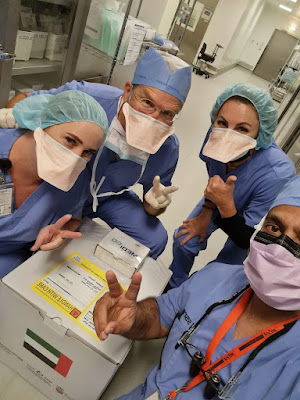I spoke in Jerusalem yesterday about kidney exchange, and one of the things I talked about is the kidney exchange between Israel and the UAE. At the time (summer 2021) I was careful not to blog about anything beforehand, because there were delicate political issues, and so I didn't start to tell the story until I returned from the UAE, and I waited until the story appeared in a U.S. newspaper.
I never got around to linking to the stories in the Israeli press, so here are two. via Google translate.
From ynet:
Historical transplant: Shani's kidney will be transplanted into an Abu Dhabi resident, her mother will receive a kidney in Israel Shani Markowitz of Nesher is expected to go down in history this week as the first Israeli to have her kidney transplanted into the body of a resident of Abu Dhabi. The transplant will be carried out as part of an international crossover program in which an Israeli citizen will also receive a kidney from a resident of the United Arab Emirates. Markowitz: "My goal is for my mother to receive a kidney in exchange." Prof. Eitan Mor, Director of the Sheba Transplantation Center: "It is possible that after the Corona we will meet face to face" by Adir Yanko, 24.07.21
and from Mednews Israel
Israel Kidney Crossing Abu Dhabi
"Medical fruits of the peace agreement with the United Arab Emirates: a kidney, donated at the Sheba Hospital, was flown and transplanted in Abu Dhabi, in exchange for a kidney donated in Abu Dhabi and transplanted at the Rambam Hospital
"July 28, 2021 was a historic day for the State of Israel, the Ministry of Health, the National Center for Transplantation and the kidney patients and their families: thanks to the transfer of a kidney in a crossover, from Israel to Abu Dhabi and from Abu Dhabi to Israel, three transplants were performed on this day, two of them in Israel
...
"Dr. Tamar Ashkenazi, director of the National Center for Transplantation and the initiative [said]of the cooperation: "The program was theoretically born from the moment the Abraham Agreement was signed in September 2020, and from the day the agreement between the Ministries of Health was signed on April 21, 2021, we began to move rapidly towards the agreement on the crossbreeding program. An American company assisted in the agreement which accompanies the program in the Emirates, APKD, along with laboratory data provided to us by the company. The matches were found by Prof. Itai Ashlagi, an Israeli researcher at Stanford, with the help of software he developed and even donated to us. Prof. Ashlagi accompaDr. Tamar Ashkenazi, director of the National Center for Transplantation and the initiativenies us in all the international crosses together with Rona Simon from the transplant center. A great feeling of satisfaction accompanies us. We turned to the next crossovers and to find more matches"
#########
Here are all my posts on that and related kidney exchanges




















